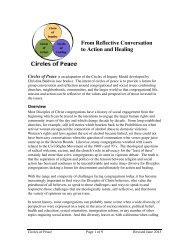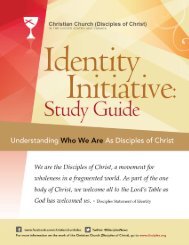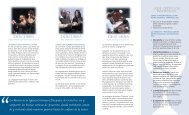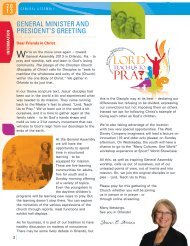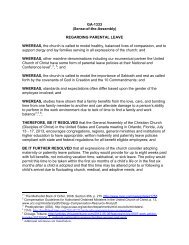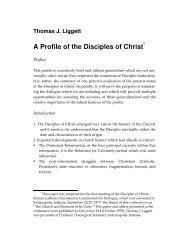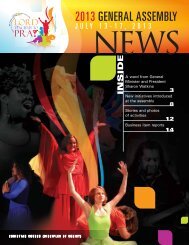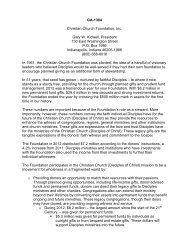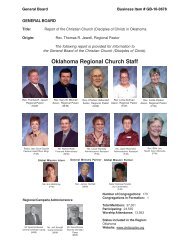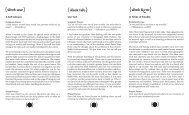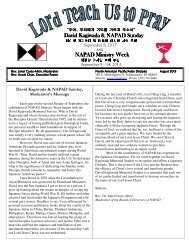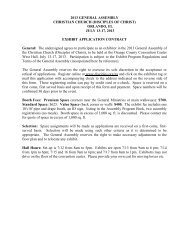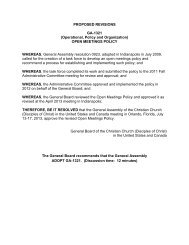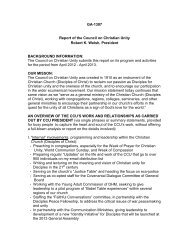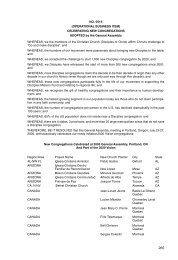RESOURCING THE CHURCH FOR ECUMENICAL MINISTRy A ...
RESOURCING THE CHURCH FOR ECUMENICAL MINISTRy A ...
RESOURCING THE CHURCH FOR ECUMENICAL MINISTRy A ...
You also want an ePaper? Increase the reach of your titles
YUMPU automatically turns print PDFs into web optimized ePapers that Google loves.
Rev. Andy Mangum serves as Senior Minister of First<br />
Christian Church, Arlington, Texas.<br />
During year C, the Revised Common Lectionary<br />
places Peter’s speech to Cornelius’ household<br />
(Acts 10:34-43) on Easter Sunday. At first glance,<br />
the lectionary selection seems anachronistic. Most<br />
of Acts occurs after Pentecost; an Easter Day reading<br />
is at least 50 days too early. Yet the speech<br />
summarizes the ministry, death and resurrection of<br />
Jesus of Nazareth. So its content fits the transitional<br />
service from the Triduum to Eastertide. That raises<br />
another question entirely: What is the proclamation<br />
of resurrection doing at a juncture like this? The<br />
story is a boundary-crossing story—Peter crossed<br />
the boundary from the Jewish into the Gentile<br />
world. Peter’s sermon to Cornelius’ household<br />
could have recounted any number of stories about<br />
how open minded and receptive Jesus had been to<br />
the other in his ministry. But he passes over those<br />
stories to emphasize Jesus’ crucifixion and his<br />
resurrection. Why?<br />
The speech and the events surrounding it form an<br />
important transition in the narrative of Luke-Acts.<br />
Everett Ferguson refers to this as the “Gentile<br />
Pentecost.” The speech was a transitional moment<br />
in the ministry of the early church in the same way<br />
that Jesus’ sermon in Nazareth (Luke 4:16-30) was<br />
a transitional moment in Jesus ministry. In his<br />
speech Peter proclaims, “In every nation anyone<br />
who fears [the Lord] and does what is right is<br />
acceptable to him” (Acts 10:35). “Acceptable” is the<br />
translation for dektos. The author of Luke-Acts uses<br />
this word only three times in his two-volume work.<br />
The word is used twice in Jesus’ inaugural sermon<br />
(4:19 and 4:24) and here in the initial mission to<br />
the Gentiles. David Balch writes, “The prophecy<br />
Boundary Crossing,<br />
Conversion and Resurrection<br />
A Bible Study on Acts 10:34-43<br />
Andy Mangum<br />
41<br />
from Isaiah with which Jesus climaxes his inaugural<br />
sermon is fulfilled by God’s acceptance of a pagan/<br />
Roman centurion into the people of God in Acts<br />
10, which generated significant disputes in the early<br />
church, resulting in the first church council (Acts<br />
15).” Balch suggests that the inaugural speech of<br />
Jesus claims a ministry of proclaiming the Lord’s<br />
acceptance of the Gentiles and news of such<br />
acceptance started to reach Gentiles with the<br />
conversion of Cornelius. There are other links<br />
between Luke 4 and Acts 10: emphasis on the<br />
Galilean beginning (Luke 4:14; Acts 10:37);<br />
Nazarean origin (Luke 4:16; Acts 10:38); the<br />
anointing of the Spirit (Luke 4:18; Acts 10:38) and<br />
Jesus fulfillment of prophetic testimony (Luke<br />
4:21; Acts 10:43). Peter’s speech to Cornelius is in<br />
many ways a second inaugural speech. It is<br />
appropriate, then, for us to consider what this<br />
second inaugural speech might teach those who look<br />
at the second century of Disciples ecumenical<br />
ministry. Three themes from Luke-Acts overlap at<br />
this speech that may be instructive as we consider the<br />
future of the ecumenical ministry of our church—<br />
(1) boundary crossing and hospitality, (2) the<br />
repeated conversion of the church, and (3) the<br />
enduring significance of Jesus’ death and<br />
resurrection.<br />
Boundary Crossing and Hospitality<br />
Jesus and his disciples lived in a culture that was<br />
heavily segmented by race, religion, gender,<br />
economic status, and physical disability. People<br />
used any leverage point to separate themselves<br />
against others. The disciples had watched as Jesus<br />
ruptured boundary after boundary. Miroslav Volf<br />
writes,<br />
Jesus offset the stark binary logic that



